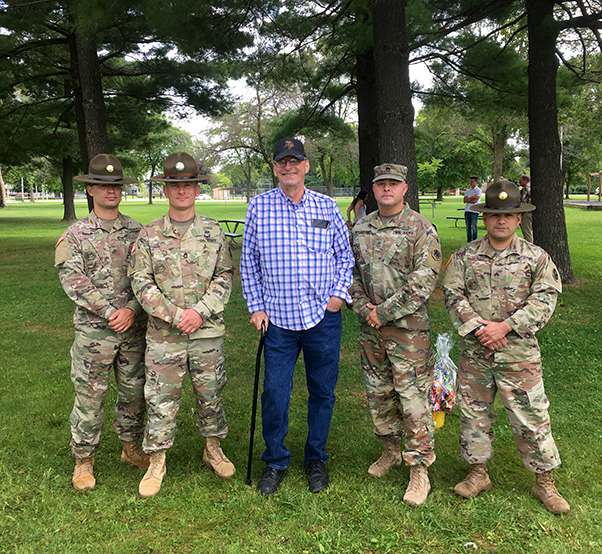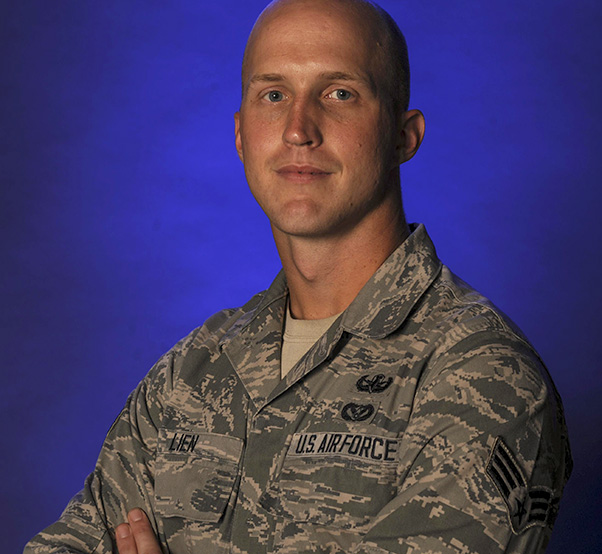
It was after 6 p.m. in the small Midwestern town as people began to end their day.
The warm colors of the mid-August afternoon sky started slipping into the evening. That’s when a handful of Army drill sergeants were inadvertently called into action, and saved a family from a burning vehicle.
Shortly before, people were driving home from work, running errands or just passing through Sparta, Wisc., on Highway 21.
Among those driving was David Turner, 62, a retired maintenance worker, who on Aug. 15 was in his silver SUV with his granddaughters — Delilah, 4, and London, 2 — on an evening cruise along the highway that connects Sparta to his hometown, Tomah, Wisc., roughly 17 miles away.
Meanwhile, several drill sergeants with the Army Reserve were also among the passersby.
They had finished a day’s work at Fort McCoy, a nearby Army base located between Sparta and Tomah, and were driving back to their hotels, said Sgt. 1st Class Eric Juhl, a drill sergeant with the 95th Training Division.
The Soldiers were on orders, training other Army Reserve drill sergeants vying for U.S. Army Drill Sergeant of the Year later that month.
The right place, at the right time
The drive was cut short after the Soldiers had pulled off the road into a nearby parking lot, tending to their first of two unexpected incidents.
The drill sergeants were parked outside of a local flower shop, and had their heads under the hood of a car, trying to pinpoint engine failure in one of the vehicles — but, they weren’t having much luck.
That’s when Sgt. Roger Williams, owner of the inoperable car, and who admits he’s “not a car guy,” called his non-commissioned officer in charge, Sgt. 1st Class Justin McCarthy — who owns a car shop in Charlotte, N.C. — for back up. Always willing to help, McCarthy arrived shortly after and identified the problem; a serpentine belt had snapped.
Williams, a Beloit, Wisc.,-native, opted to drive his personal vehicle to Fort McCoy. The other Soldiers, from various parts of the country, were driving rentals.
“We were meant to be there,” said Sgt. Daniel McElroy, a drill sergeant attached to the 108th Training Command, believing by serendipitous chance they were “at the right place, at the right time” to save lives.
As the men finished checking Williams’ car, Turner, the grandfather in a silver SUV, raced by them. Unbeknownst to the Soldiers, Turner was suffering from a medical condition at the time, rendering him unconscious. Yet his foot remained pressed on the vehicle’s accelerator.
“I noticed his vehicle going really fast before hitting a median,” said McElroy, adding that the sound of the engine racing initially caught his attention. They were stopped along a residential area, facing a four-way intersection, where vehicles typically drive slowly.
Within a fragment of a moment, the SUV smashed directly into a utility pole on the other side of the intersection, at full speed, splintering the tree-like column on impact and causing power outages in the area.
A “massive, fiery blue explosion” erupted, McElroy said, and was accompanied with multiple energy blasts shooting from the fractured utility pole. The mangled SUV caught fire.
Answering the call
Although the men were bewildered, working together came naturally. So, without a word or moment of hesitation, all four sprinted toward the burning vehicle. They felt their Army training kick in.
McCarthy, a 25-year service veteran, had experienced a similar situation during a 2007 deployment in Iraq, when his vehicle was hit by an improvised explosive device. He also has a civilian background with energy, and verified no live wires were touching the vehicle.
However, its motor was in flames, fluid had puddled onto the road around it, and black smoke from the engine poured into the air vents and filled the inside of the vehicle with smoke. It seemed the family was on borrowed time.
“The first person we checked was the driver,” Juhl said, after rushing to the vehicle, adding that Turner was conscious, but “out of it” at the time.
Turner, who suffered a fractured vertebrae among other injuries, was pinned in the driver’s seat. He woke up to the smell of air bag powder blended with engine smoke, he said, and immediately thought about his granddaughters in the back.
When the collision happened, the pole pretzeled the framework of his vehicle as easy as a soda can being crushed. The steering wheel immediately locked Turner into place. The Soldiers tried opening the driver’s side door, but it was useless.
Like Turner, the door was pinned in. However, it was bent enough for the Soldiers to fold the frame like a banana from the top, McCarthy said. They worked on the door until the glass from the driver’s side window shattered, causing black smoke to roll out from inside.
They could reach Turner with their hands, but were still unable to move him. All Turner could repeat was, “How are the girls?” in a dazed tone.
“I tried getting out on my own,” Turner later said. “The pain was so intense all I could say was ‘get the girls, leave me alone, if I die, I die.'”
At the time, the Soldiers were unaware of any passengers. Due to the smoke-filled interior, deployed side airbag curtains, and dark tinted windows of the SUV — their vision was clouded, McCarthy said. In addition, he didn’t hear any crying.
McCarthy “didn’t know what to expect” when he opened the back door, he said, and his “heart sank thinking of the children’s conditions.” He and Juhl rushed to opposite sides of the vehicle to check the children.
McCarthy was greeted by the 2-year-old, London, and he asked “is it okay if I get you out of your chair?” London, safely in her car seat, replied, “I’m 2,” ignoring the question, raising her index and middle fingers. He didn’t see injuries on the girl.
Meanwhile, Juhl checked on Delilah, who also had no visible injuries. They removed the girls without any issues.
The Soldiers “relied on their Army training in a civilian environment,” McCarthy said, adding, although it wasn’t a tactical vehicle, and they’ve “never trained with child seats,” it was comparable to “a gunner in a turret,” or similar training scenario.
Around this time, McElroy pulled Turner from the vehicle from the front passenger side door. After ensuring the victims were okay, and local responders arrived, the Soldiers slipped into the crowd and left. It wasn’t until the Turner family searched for the men that their story was able to be shared.
The drill sergeants credit readiness training for their actions.
“The Army has done an outstanding job training individual Soldiers,” McCarthy said, adding, “Things like combat lifesaving skills prepared me adequately, and without the Army’s training, I don’t know if I would have responded as effectively.”
“Those men were humble; they responded and went home,” Turner said, who is expected to make a full recovery. “But, the word ‘hero’ doesn’t touch who they are. Anybody who is in the military, if they are going through any training, should emulate the people who saved my life.”






